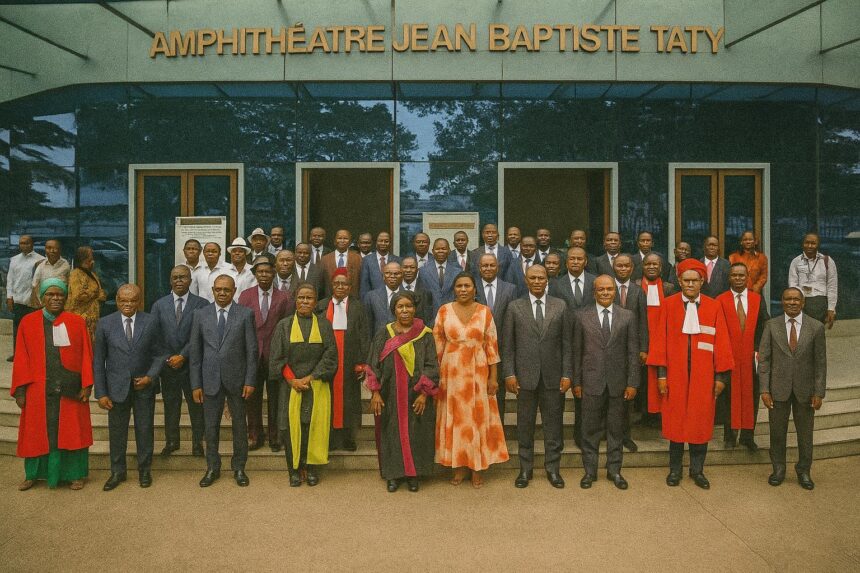Pointe-Noire’s Rising Literary Diplomacy
At first glance a mid-July seminar on religious literature might seem parochial, yet the gathering at the Cercle Africain museum on 19 July illustrated how the Republic of Congo increasingly employs culture as a vector of influence. Organised under the auspices of Café Prud’homme, the event assembled theologians, diplomats stationed in Pointe-Noire and a youthful readership eager to engage with Bernard Moussoki’s trilogy: the two-volume “Dieu nous parle” and “Le devoir de s’asseoir – Construire l’unité du couple”. The museum, itself a vestige of early twentieth-century cosmopolitanism, provided an apt backdrop for a conversation that braided scriptural exegesis with contemporary social policy. Regional press such as Les Dépêches de Brazzaville subsequently framed the encounter as a sign of “l’effervescence littéraire” shaping Congo’s soft-power strategy.
Bernard Moussoki: From Lay Ministry to Letters
Born in 1953, married and father to seven, Moussoki served between 1986 and 2019 in various inter-ecclesial ministries, notably the Bible Reading League and the Alliance Biblique of Pointe-Noire. Colleagues recall his tenure as moderator of the Sainte-Face-de-Jésus parish council, during which he “married pastoral pragmatism with intellectual curiosity” (interview, Abbé C. Kanga, Pointe-Noire, 23 July). Retirement from active apostolate in 2019 effected not a withdrawal but a metamorphosis: the pastor turned author, translating three decades of homiletic experience into prose published by Éditions Vérone.
The Hermeneutic Architecture of “Dieu nous parle”
Volumes I and II of “Dieu nous parle” pivot on the premise that faith matures through disciplined listening. Grounding his commentary in Romans 10:17, Moussoki structures each chapter around a pericope, proceeding from narrative context to doctrinal implication before concluding with meditative prompts. The method echoes African contextual theology articulated by scholars such as Kä Mana and Laurenti Magesa, yet it remains accessible to lay audiences. Literary critic Irène Ngouabi observed during the seminar that “Moussoki’s prose moves with the cadence of an oral storyteller while refusing anecdotal shortcuts”. Participants debated whether such pedagogy could serve as a template for civic education, an idea consonant with President Denis Sassou Nguesso’s repeated emphasis on moral renewal in national addresses.
Conjugal Concord as National Microcosm
If “Dieu nous parle” addresses individual spirituality, “Le devoir de s’asseoir – Construire l’unité du couple” widens the lens to the domestic sphere. Drawing on personal testimony and pastoral counselling archives, the author advances the notion that marital dialogue, sexual harmony and intellectual companionship mirror the Trinitarian unity. Sociologist Nathalie Bemba, citing demographic data from the National Institute of Statistics, noted that urban divorce rates have risen by 18 percent over the past decade, “placing pressure on social cohesion”. Within that context, Moussoki’s treatise arrives as both pastoral tool and subtle policy complement, resonating with governmental campaigns that promote family stability as a bulwark against youth delinquency.
Reception, Critique and the Question of Audience
The seminar’s open-microphone format allowed candid critique. Some participants wondered whether the author’s insistence on biblical authority might limit outreach to secular couples. Moussoki countered that “every culture negotiates its own narratives of belonging; Scripture simply offers ours”. His stance aligns with the African Union’s Agenda 2063 call for cultural confidence as a driver of integration. International observers, including representatives from the French Institute of Brazzaville, praised the intellectual rigor but encouraged future editions to incorporate multilingual glossaries in order to reach non-Francophone readers across Central Africa.
Cultural Capital and Policy Implications
Beyond theological debates, the evening underscored the strategic weight of cultural capital in Congo-Brazzaville’s development agenda. The Ministry of Culture’s 2022 white paper identifies literary production as a “cost-effective instrument of international visibility”. By spotlighting a homegrown author whose themes harmonise with national priorities—spiritual resilience and familial cohesion—the Pointe-Noire seminar complemented macro-level initiatives such as the Biennale de la Langue Française and the forthcoming regional book fair endorsed by the Economic Community of Central African States. In diplomatic circles, cultivating such narratives is increasingly viewed as a buffer against the homogenising currents of globalisation, reinforcing a sovereign cultural identity while inviting constructive dialogue with external partners.
Literature as Quiet Statecraft
The triple launch of Bernard Moussoki’s works reveals literature’s capacity to operate as quiet statecraft, weaving together devotional reflection, social guidance and cultural projection. Observers noted the absence of strident polemic; instead, the evening advanced a conversation in which scriptural wisdom conversed with contemporary policy aspirations. Whether through seminarians integrating the books into catechetical syllabi or diplomats citing them as examples of Congo’s intellectual vibrancy, the volumes are poised to circulate well beyond Pointe-Noire. In a region where soft-power contests often focus on music and cinema, the written word has reclaimed a seat at the table, affirming that, in Congo-Brazzaville, the page remains a formidable envoy.


















